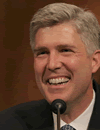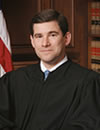Hon. Neil Gorsuch
United States Court of Appeals for the Tenth Circuit (2006-Present)
This post covers two First Amendment retaliation cases by Supreme Court nominee Judge Neil Gorsuch. Judge Gorsuch writes one opinion and joins another in cases constrained by precedent.
- Casey v. West Las Vegas Ind. School Dist., 473 F. 3d 1323 (10th Cir. 2007)
- Brammer-Hoelter v. Twin Peaks Charter Academy, 602 F.3d 1175 (10th Cir. 2010)
Casey v. West Las Vegas Ind. School Dist.
A school board demoted and eventually released a by-the-book school superintendent.
Judge Gorsuch, writing for a Tenth Circuit panel, examined whether the board retaliated unconstitutionally against the administrator. The case halted while the Supreme Court decided a similar case, Garcetti v. Ceballos, 126 S.Ct. 1951 (2006). Garcetti scrambled the arguments and changed the analysis. Following it, the Tenth Circuit panel found one claim survived.
Barbara Casey notified her West Las Vegas (NM) school board of potential problems with her school’s federally funded Head Start program. Specifically, a subordinate told her some families flaunted income eligibility cutoffs. The board ignored her warnings, so she sent her subordinate to the U.S. Department of Health & Human Services. HHS investigated and validated Casey’s claims. The agency made the district repay federal funds.
Casey also objected to board meeting protocols arguing they violated the state’s open-meeting laws. Again, the board ignored her warnings, and again she independently contacted the overseeing authority – the state attorney general. The AG concluded the board had indeed not complied with the law.
The Board demoted Casey and later chose not to renew her contract.
In light of Garcetti, the panel decided whether Casey spoke in her capacity as a government employee or as a citizen.
Regarding HHS, the court found she spoke as a public official:
The Supreme Court last Term in Garcetti . . . added some clarity to the question when a public employee speaks as a citizen rather than as an employee. Specifically, the Court held that when public employees speak “pursuant to their official duties, the employees are not speaking as citizens for First Amendment purposes, and the Constitution does not insulate their communications from employer discipline.” . . . we are obliged to ask whether Ms. Casey met her burden by providing evidence that her expressions were made in her capacity as a citizen and not pursuant to her “official duties.”
Ms. Casey’s statements with respect to the Head Start program themselves are of two types. The first, and the bulk of her comments, involve statements directed to the School Board conveying concern about the District’s lack of compliance with federal regulations. In our view, these statements do not form the basis for a colorable First Amendment retaliation claim after Garcetti for reasons Ms. Casey has already identified. That is, these comments were directed only to her supervisors and, in each instance, Ms. Casey sought to raise concerns about the legality of the District’s operations.
One remaining statement about the Head Start program that might give rise to a cause of action concerns Ms. Casey’s instruction to [subordinate] Ms. Padilla that the latter should contact federal authorities and convey their mutual concerns about the legality of the District’s Head Start operations. Here, Ms. Casey did not advise her employers but instead went very much around them. The question before us is whether, in doing so, Ms. Casey used Ms. Padilla as her agent to engage in protected citizen whistleblowing, or whether Ms. Casey acted pursuant to her official duties in ordering a subordinate to report the District’s regulatory noncompliance to federal authorities.
And it is undisputed that Ms. Casey was designated by the Board as the CEO and person primarily responsible for the sound administration of the District’s Head Start program. In accepting this assignment, Ms. Casey necessarily assumed certain responsibilities, pleasant and unpleasant, and these included acting pursuant to, or in compliance with, certain federal regulations. Rules issued by HHS expressly state that families with children enrolled by Head Start grantees must meet specific income eligibility requirements. The regulations also indicate that “[a] grantee’s failure to comply with [such eligibility] requirements … may result in a denial of refunding or termination.” Further, at the time these events took place, individuals, like Ms. Casey, with knowledge of financial irregularities risked civil and criminal liability by remaining silent in the face of such knowledge.
It is also notable that Ms. Casey acted not on her own in this matter, but thought it sufficiently a part of her job duties to report the District’s financial irregularities to HHS that she deemed it appropriate to order a subordinate, Ms. Padilla, to contact Head Start officials; nor did the latter blanch at Ms. Casey’s direction or give any other intimation that she thought she or Ms. Casey might be acting beyond the scope of their employment.
The court found her attorney general foray was done as a citizen:
Ms. Casey first reported her concerns about the Board’s failure to comply with the New Mexico Open Meetings Act to the Board itself; when that proved unavailing, Ms. Casey personally took the issue to the New Mexico Attorney General. With respect to Ms. Casey’s statements directed to the Board, it seems to us significant that they were made solely to her superiors and Ms. Casey, as Superintendent, had a duty to provide candid advice and counsel to the Board, much as any corporate CEO might to his or her board of directors. This, in our view, suffices to preclude a claim under Garcetti.
The statements made to the New Mexico Attorney General, however, are another kettle of fish. In the first place, Ms. Casey was not seeking to fulfill her responsibility of advising the Board when she went to the Attorney General’s office. Just the opposite: she had lost faith that the Board would listen to her advice so she took her grievance elsewhere.
But, very much unlike the administration of the Head Start program that the Board committed to her care and pursuant to which she had independent responsibilities to the federal government, we have no evidence in the summary judgment record before us suggesting that the Board or any other legal authority ever assigned Ms. Casey responsibility for the Board’s meeting practices. Rather, the evidence before us suggests that the Board members alone were responsible for making certain their meetings complied with New Mexico law at the time. Accordingly, we conclude that Ms. Casey’s conduct fell sufficiently outside the scope of her office to survive even the force of the Supreme Court’s decision in Garcetti.
Brammer-Hoelter v. Twin Peaks Charter Academy
Judge Gorsuch joined this opinion ruling against charter-school teachers that claimed a school administrator chilled their First Amendment rights of speech and association.
Administrator Dorothy Marlatt banned teachers from discussing school matters with anyone and preferred they never meet socially. Undeterred, the teachers changed clandestine meeting locations and staggered leaving times. Marlatt retaliated with poor evaluations. The teachers eventually resigned, but changed their tune when Marlatt herself resigned. The school did not welcome them back.
The court evaluated Marlatt’s actions against the teachers’ claims of prior restraint on their speech and association and Marlatt’s claim of qualified immunity. The court found Marlatt’s no-carousing suggestion was not a directive and thus not a prior restraint. It did, however, find Marlatt’s ban on discussing school business a prior restraint.
But that was only the first step. Marlatt argued qualified immunity protected her because the violations were not clearly established law.
The court agreed:
[W]e conclude controlling precedent would not have put a reasonable administrator on notice that the speech at each meeting, viewed in the aggregate, was protected by the First Amendment. We therefore hold Dr. Marlatt is entitled to qualified immunity because the protected nature of Plaintiffs’ speech was not clearly established at the time she took the alleged retaliatory actions.
The court also cleared the school because Marlatt was not the final policymaking authority. This shielded the school through municipal-law principles.













